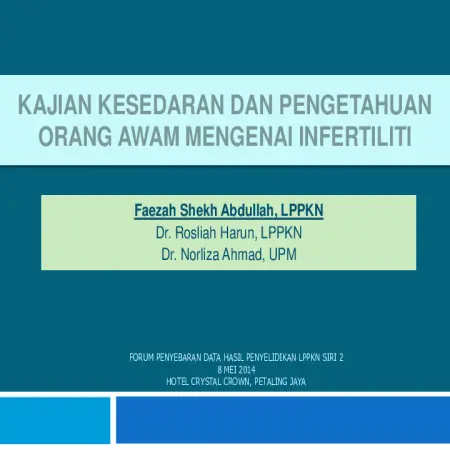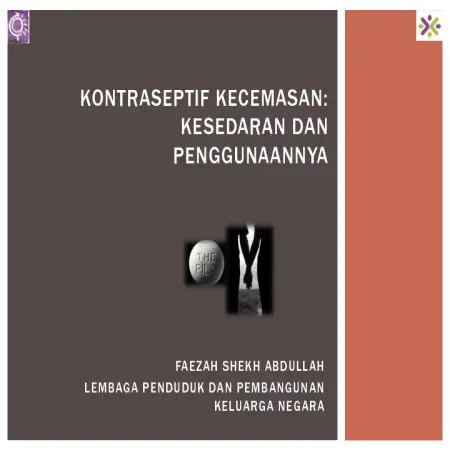Browse by Author
Results for Family Name : "Shekh Abdullah" AND Given Name/Initial : "Faezah"
|
|
Kajian kesedaran dan pengetahuan orang awam mengenai infertiliti
Item Type: Conference or Workshop Item
Editor:
Year: 00/00/2014
Abstract: The infertility rate in Malaysia is estimated around 10 to 15 %. World Health Organization has classified infertility as a disease that needs attention as early as possible. It is one of the factors that contribute to decreasing total fertility rate. Public misunderstanding regarding infertility may affect on how they handle this issue. People always take this issue lightly since it is not a life-threatening disease, unlike heart attack, diabetes and cancer. The Bertarelli Foundation Scientific Board (1999) had found that infertility awareness was still low in a few countries in Europe, such as Belgium, Italy, France, Germany, Sweden and United Kingdom. Knowledge on infertility is very crucial because it helps couples to prepare when they are having difficulty in conceiving. The objective of this study was to identify our local people awareness and knowledge on infertility issues as very few studies have been done in Malaysia.
|
|
|
|
|
|
Kontraseptif kecemasan: kesedaran dan penggunaannya
Item Type: Conference or Workshop Item
Editor:
Year: 00/00/2012
Abstract: Emergency contraceptive (EC) is one of the methods of contraception used after unprotected sex. With proper use, this method of emergency contraception can help reduce the problems of unplanned or unwanted pregnancies that have been frequent in recent times. The objective of this study was to identify women’s awareness of emergency contraceptive methods and their level of use. The research method involved the distribution of questionnaires to 1000 women, aged 15 to 49 years, who attended programs organized by NPFDB. Data collection and analysis was carried out using SPSS 11.5 software. The chi -square test was used to study the relationship between the sociodemographics of the respondents and the variables studied. The coverage of the study consisted of 84% Malay women, and was followed by Indians (9%) and Chinese (6%). The majority of respondents (43%) were in the range of 25 to 34 years, with a mean age of 33 years. Contraceptive use among respondents was found to be 26.3%, of which 98% were married women. The study found that women’s awareness of EC and its level of use was low, being only 29% and 3.9%, respectively. The chi -square test results showed that the level of awareness of EC increased with age (p <0.05). In addition, more highly educated women were found to have heard of EC (p <0.05) compared to low levels. Most EC users are from the married group. Nearly 70% of women who are using contraceptives are found to have used EC. Among women who have never used EC, only 21% are interested in using it in the future. However, the majority (70%) support this service provided at NPFDB. The lack of exposure on EC results in the number of women interested in using it being low. Therefore, NPFDB and related parties need to enhance promotional activities, advocacy and learning of emergency contraceptive methods, in addition to other methods, so that the community knows about it and can use it during emergencies.
|
|
|
|







